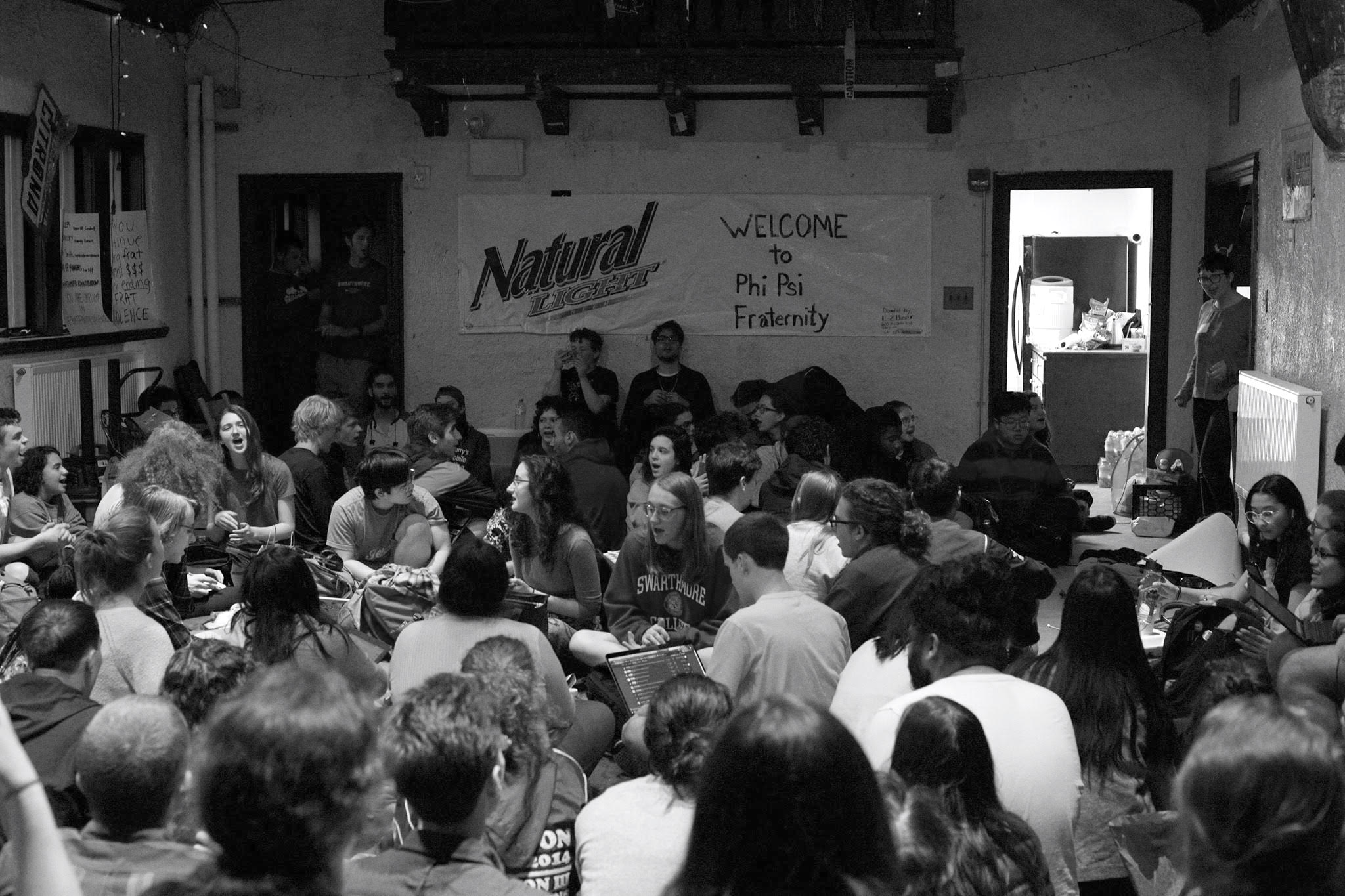On April 30th, numerous national newspapers ran articles on the closure of two Swarthmore fraternities after documents were leaked that show bragging about sexual conquests and a “rape attic.”
Students of the Pennsylvania liberal arts college staged a sit-in in one of the fraternity houses, Phi Psi; they sought to make the school shut down the fraternity. The protesters call themselves the Coalition to End Fraternity Violence. Their action came after school publications released the fraternities’ internal documents stating obvious cases of drug and sexual abuse. The two fraternities implicated — Phi Psi and Delta Upsilon — have disbanded.
The leaked fraternity documents reignite the national conversation around the role that fraternities have on college
campuses and within society as a whole. At Swarthmore, in particular, students have been pressuring the college for years to close the fraternity houses. Students and faculty have long known about the destructive, harmful behavior of these fraternities, but the administration has failed to hear their worries.
While the administration has not acted in the past, Swarthmore’s current president, Valerie Smith, has taken a stand. She called the language and behavior described in the documents “heinous” and was quoted in The New York Times saying that “the racism, misogyny and homophobia described within [the documents] is antithetical to the values of the college.”
At Swarthmore College, fraternity culture is similar to that of many other colleges. Fraternities have been under examination from the administration since before the documents were leaked — especially in the wake of the #MeToo movement. The Association of American University sent out a survey in 2015 to examine this destructive culture within colleges. A quarter of the women in college who responded said they had been sexually assaulted in college at least once. In response to this survey, many universities set up programs to educate students about equity and respect in sexual relationships, working to combat sexual abuse and misogyny as well as other injustices involving racism and homophobia.
While they admitted that sexual assault needed to be addressed, many colleges’ administrations were unsure of how to proceed in dealing with the fraternities. Many fraternities promote a culture of excessive partying and drinking as well as sexual misconduct. That being said, there are also countless stories of men speaking about the social, professional and emotional support that fraternities have provided for them. While both the negatives and the positives of fraternity culture may be true, they do not exist without each other. The brotherhood that is created through the partying seems to lead to the professional development that helps many fraternity graduates thrive. This type of community fosters success in the workforce, but only for a certain type of man. Many young adults share the expectation that where they go to college will impact the rest of their lives; fraternities also play a monumental role in shaping a student’s future. The community promoted in fraternities allows men to push each other forward. And this also means pushing men with questionable morals forward – and enabling them to continue to abuse others in the workplace and social landscape of the adult world.
In October, 2019, the world watched Dr. Christine Blasey Ford come forward to accuse and testify against then-nominee to the Supreme Court of the United States Brett Kavanaugh, now Justice Brett Kavanaugh, of sexually assaulting her while they were in high school. While it seemed obviously clear to me that Dr. Ford was telling the truth, Kavanaugh was able to work around these allegations. Hurtful to so many, Kavanaugh was nevertheless chosen to move forward. The Republican majority in the U.S. Senate voted to affirm Kavanaugh, President Trump’s Justice pick, to the court. He was confirmed on October 6, 2018.
While at Yale University, Brett Kavanaugh was a member of the Delta Kappa Epsilon fraternity. The DKE fraternity was notorious, known for their disrepct towards women and their famous chant: “Yes means no and no means anal.”
While Dr. Ford’s allegations do not come from Kavanaugh’s time in college, the fact is that the man she accused of abusing her in high school joined a fraternity that shared his morals—morals that would support his alleged previous actions. After the allegations surfaced, Kavanaugh was immediately defended in the media by many powerful men such as CEOs of wealthy companies and former NBA player Chris Dudley who graduated from Yale and were members of the same fraternity. Again, the brotherhood that is created in the fraternities seems to be so strong that it can actually do harm. Young men mature in a culture of toxic masculinity. They are expected to have an unwavering loyalty to those in the brotherhood no matter how egregious their actions. These harmful actions come to be seen as normal.
When my friends and I were going through the college process, the presence of fraternity culture on campuses was a big factor in making decisions. It is undoubtedly scary to go into the next four years of your life with the statistics that 1 in 5 women and 1 in 71 men are sexually assaulted during their lifetimes. With the presence of fraternities on campus, the odds for sexual assault are higher.
During the college process, I thought that the most toxic fraternities were mostly found at bigger schools that were stereotypically more focused on partying. What I found, however, disproved this. It isn’t only the bigger schools that have destructive fraternities. People at any and all schools who want this type of culture find it and can specifically find it within the school’s fraternities.
Swarthmore is a perfect example. It is advertised as a small, elite, progressive liberal arts school, where they don’t have a huge Greek life component. However, the college does have a Greek presence. College students who want this party culture and can’t find it within other school communities drift towards fraternities. Again, by definition, the fraternity promotes brotherhood and closeness, but not a compassionate and inclusive closeness. Rather, fraternities promote an exclusive and toxic brotherhood which in turn leads members to see brotherhood through a harmful lens that defines injustice as masculine fun.







